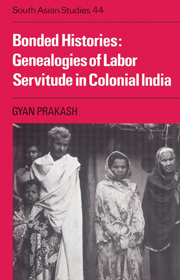Book contents
- Frontmatter
- Contents
- List of illustrations
- List of tables
- Preface
- Conventions followed in the text
- List of abbreviations
- Introduction: the discourse of freedom
- 1 Places of bondage
- 2 True stories
- 3 Land is to objectify
- 4 Freedom found and lost
- 5 Contested power
- Conclusion: freedom bound
- Appendix
- Glossary
- Bibliography
- Index
- CAMBRIDGE SOUTH ASIAN STUDIES
- Frontmatter
- Contents
- List of illustrations
- List of tables
- Preface
- Conventions followed in the text
- List of abbreviations
- Introduction: the discourse of freedom
- 1 Places of bondage
- 2 True stories
- 3 Land is to objectify
- 4 Freedom found and lost
- 5 Contested power
- Conclusion: freedom bound
- Appendix
- Glossary
- Bibliography
- Index
- CAMBRIDGE SOUTH ASIAN STUDIES
Summary
Where did he get so many eyes to spy on you with, if you didn't lend them to him? How did he come by so many hands to beat you with, if he didn't take them from you? The feet with which he tramples on your cities – where did he get them from, if they're not yours? How can he have any power except by your own doing? What could he do to you if you didn't protect the thief who robs you, if you weren't the accomplice of the murderer who kills you, if you weren't traitors to your own cause?
Etienne de la Boétie, Discours de la servitude volontaire, 1943.Much to the disappointment of colonial officials, the kamias never learned to value freedom. The 1920 Bihar and Orissa Kamiauti Act failed in its attempt to abolish debt-bondage when the kamias showed no interest in using the new law to declare their freedom. The 1934–36 inquiry and the accompanying official attempt to disseminate the message of liberty ended on a somber note when the government admitted defeat in the face of the kamias' refusal to seek emancipation in freedom. The kamias' failure to rise in a heroic revolt, their refusal to rend the sky with the cry of freedom, may suggest that they passively acquiesced to their subordination, that they were as complicit in their own oppression as their oppressors.
- Type
- Chapter
- Information
- Bonded HistoriesGenealogies of Labor Servitude in Colonial India, pp. 184 - 217Publisher: Cambridge University PressPrint publication year: 1990



